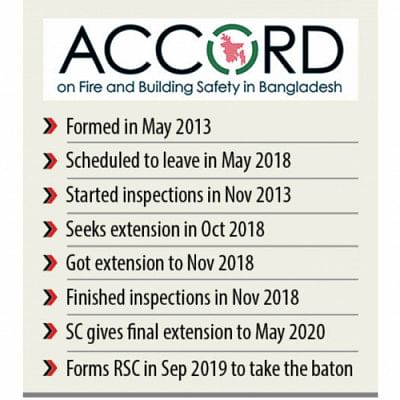Accord to finally pack bags in May

The Accord on Fire and Building Safety in Bangladesh, the platform of more than 190 mostly Europe-based retailers formed after the Rana Plaza building collapse, is finally leaving the country this May.
Originally scheduled to leave at the end of its five-year tenure in May 2018, the platform wanted to stay on for three more years, which the government was opposed to. Accord took the matter to court and managed to win an extension until February 13, 2020.
But it will depart for good in May.
A national collaborative committee with representation of brands, unions and industry leaders will take over Accord’s monitoring duties, according to Rubana Huq, president of the Bangladesh Garment Manufacturers and Exporters Association (BGMEA).
“We are taking over from Accord all of its resources and will follow their protocols but it will be based on the national context,” she added.
The agency essentially checked and recommended Corrective Action Plan (CAP) for fire, electrical and structural loopholes in the garment industry of Bangladesh after the deadly industrial accident that claimed 1,134 lives and injured another 2,000.
It recommended CAP to more than 1,600 garment factories and ensured remediation for the workplace safety.
Many of the garment factories failed to remediate as per the recommendations by the Accord experts and engineers because of their bad financial condition. Some of the factories were closed down, too.
But, most of the companies in Bangladesh followed the CAP and remediated their factories as per the recommendations.
However, the Accord experts and engineers recommended some unnecessary or repeated remediation and expensive ones to the factory owners in Bangladesh. As a result, many garment factory owners were not happy. This prompted a host of factory owners to file a case against the inspection agency with a court in The Hague, where the headquarters of the Accord are located.
However, the case was transferred to Bangladesh as it was too expensive for the owners to frequently fly to the Netherlands and engage lawyers. Finally, the case was moved to the Supreme Court, which extended the Accord’s tenure in May last year to February 13 this year.
However, the Accord and BGMEA came to a mutual understanding in September last year to form the RMG Sustainability Council (RSC) to continue the remediation and monitoring of the factories.
The RSC is a tripartite compliance and safety monitoring body of the apparel sector, formally formed by brands, union leaders and factory owners.
Both the Accord and BGMEA yesterday signed a joint communique to form the RSC. The RSC will operate within the regulatory framework of the laws of Bangladesh, closely co-operating with and supporting the regulatory functions of the Government of Bangladesh.
It will retain all health and safety inspections and remediation, safety training and complaints handling functions currently carried out by the Accord, the communique said.
All existing transparency features of the Accord will be maintained, including full public disclosure of inspection results and remediation activities.
All operations, staff, infrastructure and functions of the Accord Office in Dhaka will be transferred to the RSC and the RSC will appoint a chief safety officer, retaining the same independence, autonomy, authorities and reporting requirements practiced by the Accord.

 For all latest news, follow The Daily Star's Google News channel.
For all latest news, follow The Daily Star's Google News channel. 




Comments